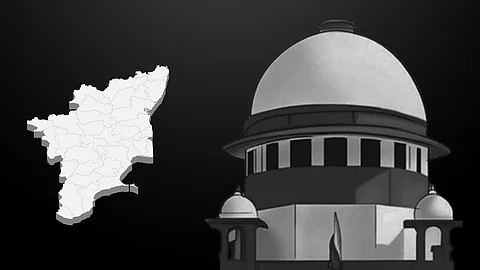

THE TAMIL NADU GOVERNMENT TODAY approached the Supreme Court challenging a Madras High Court interim order that restrained the use of names of living individuals, portraits of former chief ministers and ideological leaders, and party insignia in advertisements promoting government welfare schemes.
A bench led by Chief Justice of India B.R. Gavai, along with Justice K. Vinod Chandran, agreed to list the matter later this week following a mentioning for an early listing by senior advocate Mukul Rohatgi, who appeared for the Tamil Nadu government.
“This is a very unusual and urgent case. No scheme of the Government can have the name of the Chief Minister or any political figure,” Rohatgi told the Court, seeking immediate listing.
On July 31, the Madras High Court had issued interim directions barring the state government from naming any new or rebranded public welfare scheme after a living personality. It also restrained the use of images of any former chief minister, ideological leader, or the emblem, insignia, or flag of the ruling Dravida Munnetra Kazhagam (‘DMK’) party in promotional materials issued for these schemes.
The High Court passed the order on a petition by AIADMK Member of Parliament C. Ve. Shanmugam, who had alleged that the state government was naming new schemes after the current Chief Minister and using images of ideological leaders and the DMK’s party symbol in violation of the Supreme Court’s earlier directions and the 2014 Government Advertisement (Content Regulation) Guidelines.
Shanmugam argued that this practice misused state resources to promote political figures and party ideology, compromising the neutrality expected in public governance and in violation of established legal standards.
The High Court, while acknowledging that the Supreme Court had earlier permitted the publication of the current Chief Minister’s photograph, observed that the use of portraits of ideological leaders and former chief ministers appeared prima facie contrary to the top Court’s directions.
The High Court’s order strikes at the heart of Tamil Nadu’s long-standing tradition of leader-centric welfare branding, a hallmark of both DMK and AIADMK regimes. The DMK government’s decision to challenge it signals concern over the potential curb on political messaging ahead of upcoming local body polls.
In a landmark judgment, the Supreme Court on May 13, 2015, barred the use of politicians’ photos in government ads to prevent promotion of personality cults. Only images of the President, Prime Minister, Chief Justice of India, and departed national leaders like Mahatma Gandhi were permitted. The Court held that such ads using political figures misuse public funds and undermine democratic functioning.
On March 18, 2016, the Supreme Court modified its earlier May 13, 2015, ruling that had restricted government ads to only feature photos of the President, Prime Minister, and Chief Justice of India. Accepting review pleas by the Centre and several states, the Court allowed inclusion of governors, chief ministers, and departmental ministers in such advertisements, acknowledging the federal structure. All other restrictions from the May 2015 judgment remained in force.
The matter is now expected to come up for hearing before the Supreme Court later this week.